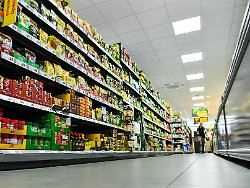Friday 5th November 2021
Beverages, confectionery, tobacco
More and more goods are becoming scarce in retail
The delivery crisis is worsening. Retailers not only report supply problems with non-food goods, but also “persistent bottlenecks and failures” with food. Filling shelves is a “daily struggle”, an Edeka manager is quoted as saying.
The supply chain chaos in the grocery trade is apparently slowly getting down to business. According to research by the “Lebensmittelzeitung”, the supply problems no longer only affect non-food goods, but also the core business of supplying food.
According to research by the newspaper, several wholesalers have informed their customers about delivery problems in the past few days. The Lekkerland Group, which belongs to Rewe and primarily supplies gas stations and kiosks, but also food retailers, admitted “persistent bottlenecks and failures”. The Transgourmet subsidiary Selgros, which focuses on commercial customers, also complained about the “tense availability of goods and ability to deliver in industry”.
There is little consolation, the food newspaper quotes from a letter from Lekkerland, “that we are not alone: other channels, such as the food retail sector, are equally affected”. A top manager at Edeka is said to have described maintaining the availability of goods as a “daily struggle”.
According to the wholesalers’ letter, the areas of beverages, confectionery and tobacco products are affected. Manufacturer names mentioned include Coca-Cola, Ferrero, Lorenz Bahlsen, Mars, and British American Tobacco (BAT). It is true that empty shelves are not threatened across the board, “but we will see gaps,” the paper quotes the manager of Edeka. According to dealer information, Coke cans have not been available for weeks. So far, however, many companies have not wanted to comment specifically on the bottlenecks.
Discounters postpone the start of sales in the non-food sector
Just recently, the food newspaper had already reported on delivery bottlenecks at the discounters Lidl and Aldi in the non-food sector. Aldi Nord had to postpone the start of sales of the coveted “Aldi Original” collection. It was said that empty shelves in the non-food area had already become visible in mid-October. “That really costs sales,” commented Carsten Kortum, professor at the Heilbronn Cooperative State University, opposite the newspaper. There were also delays with individual promotional items at the discounter Lidl. The company said that the corresponding advertising dates would be “adjusted”.
The reasons for the bottlenecks are not only supply chain problems, but also the raw material crisis. The prices for aluminum, which is needed for cans, as well as stainless steel, paper and plastic have been going through the roof for some time. Manufacturers want to pass the rising packaging and production costs on to customers.
“The industry has announced price increases and this is now inevitably affecting the retail sector,” Ifo expert Klaus Wohlrabe recently commented on a company survey conducted by his institute. Industry negotiations should already be in full swing in the background. At this time of year, a large industry meeting is routinely held at which the conditions for the coming year are negotiated.
Big brands and popular companies take part in the annual rounds, making up almost two thirds of the total range at discounters and supermarkets. If the manufacturers actually push through higher prices, it is very likely that inflation will rise towards five percent in the coming months.
